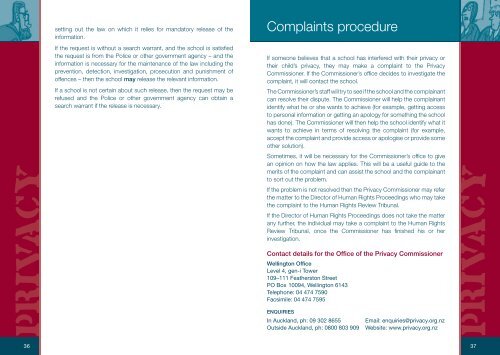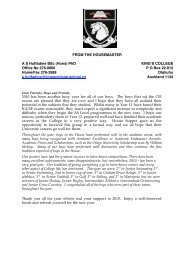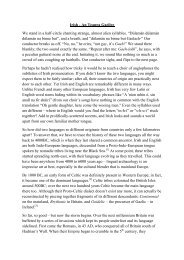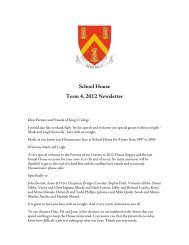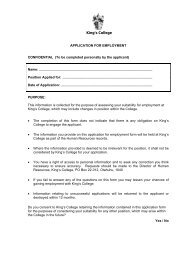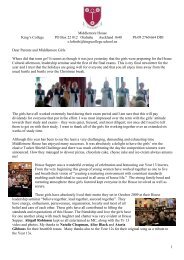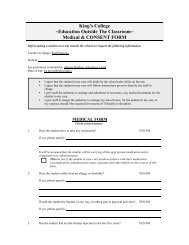Privacy in Schools - Office of the Privacy Commissioner
Privacy in Schools - Office of the Privacy Commissioner
Privacy in Schools - Office of the Privacy Commissioner
You also want an ePaper? Increase the reach of your titles
YUMPU automatically turns print PDFs into web optimized ePapers that Google loves.
18<br />
PRIVACY<br />
• The <strong>in</strong>formation is an evaluation or an op<strong>in</strong>ion compiled solely for <strong>the</strong><br />
purposes <strong>of</strong> award<strong>in</strong>g scholarships or awards, honours or o<strong>the</strong>r<br />
benefi ts and <strong>the</strong> evaluation or op<strong>in</strong>ion was given <strong>in</strong> confi dence.<br />
• Disclosure will mean a breach <strong>of</strong> legal pr<strong>of</strong>essional privilege. For<br />
example, <strong>the</strong> Board <strong>of</strong> Trustees may withhold its lawyer’s legal<br />
op<strong>in</strong>ion with respect to a student’s expulsion.<br />
• The request is obviously not made for any legitimate reason, or <strong>the</strong><br />
<strong>in</strong>formation requested is trivial. While this withhold<strong>in</strong>g ground is<br />
designed to address vexatious requests, which are designed purely<br />
to create trouble, schools should not use this withhold<strong>in</strong>g ground<br />
just because <strong>the</strong> school fi nds <strong>the</strong> request annoy<strong>in</strong>g.<br />
• Disclosure is contrary to <strong>the</strong> <strong>in</strong>terests <strong>of</strong> an <strong>in</strong>dividual under <strong>the</strong> age<br />
<strong>of</strong> 16. This does not mean that a student under <strong>the</strong> age <strong>of</strong> 16 cannot<br />
access his or her <strong>in</strong>formation. It means a school may withhold a<br />
student’s personal <strong>in</strong>formation, when that student is under <strong>the</strong> age<br />
16, if it is contrary to his or her <strong>in</strong>terests.<br />
When a parent asks a school for <strong>in</strong>formation about him or herself, it is<br />
a request under pr<strong>in</strong>ciple 6. When a parent asks a school for <strong>in</strong>formation<br />
about his or her child, it is a different matter. The chapter “Application<br />
<strong>of</strong> <strong>the</strong> privacy pr<strong>in</strong>ciples”, page 26, has some fur<strong>the</strong>r <strong>in</strong>formation about<br />
report<strong>in</strong>g to parents/guardians. In Appendix C, page 50, <strong>the</strong>re is a<br />
“Request for access to <strong>in</strong>formation checklist”.<br />
Pr<strong>in</strong>ciple 7 – deal<strong>in</strong>g with <strong>in</strong>correct personal <strong>in</strong>formation<br />
Any person has <strong>the</strong> right to ask a school to correct any <strong>of</strong> <strong>the</strong> <strong>in</strong>formation<br />
held about him or her. If <strong>the</strong> school does not th<strong>in</strong>k <strong>the</strong> <strong>in</strong>formation is<br />
wrong <strong>the</strong>n <strong>the</strong> person has <strong>the</strong> right to have a statement <strong>of</strong> <strong>the</strong> required<br />
correction/s placed with <strong>the</strong> orig<strong>in</strong>al <strong>in</strong>formation.<br />
For example, a school pr<strong>in</strong>cipal might record <strong>the</strong> behaviour <strong>of</strong> a student<br />
<strong>in</strong> a meet<strong>in</strong>g, describ<strong>in</strong>g <strong>the</strong> student as angry. The student might disagree<br />
with this assessment and ask for <strong>the</strong> record to be corrected. This does<br />
not mean <strong>the</strong> school pr<strong>in</strong>cipal has to change <strong>the</strong> record, if he or she is<br />
satisfi ed that <strong>the</strong> statement was correct. The school need only hold <strong>the</strong><br />
student’s view <strong>of</strong> <strong>the</strong> behaviour alongside <strong>the</strong> pr<strong>in</strong>cipal’s view.<br />
If <strong>the</strong>re is <strong>in</strong>accurate material, a school does not have to wait for a<br />
request for correction. If <strong>the</strong> school is aware that a record is <strong>in</strong>correct<br />
<strong>the</strong>n <strong>the</strong> school must amend it.<br />
Pr<strong>in</strong>ciple 8 – check<strong>in</strong>g for accuracy before use<br />
Before us<strong>in</strong>g personal <strong>in</strong>formation, a school must take reasonable<br />
steps to check that <strong>the</strong> <strong>in</strong>formation is:<br />
• current;<br />
• relevant;<br />
• complete;<br />
• accurate; and<br />
• not mislead<strong>in</strong>g.<br />
For example, throughout <strong>the</strong> year, schools might like to put rem<strong>in</strong>der<br />
notices <strong>in</strong> <strong>the</strong> school newsletter ask<strong>in</strong>g parents/guardians to update<br />
any change <strong>in</strong> <strong>the</strong>ir contact details.<br />
Ano<strong>the</strong>r example might be when a school receives unsolicited<br />
<strong>in</strong>formation like a compla<strong>in</strong>t about <strong>the</strong> after-school behaviour <strong>of</strong> a<br />
student. Before rely<strong>in</strong>g on this <strong>in</strong>formation, <strong>the</strong> school should check for<br />
accuracy, not only by mak<strong>in</strong>g enquiries <strong>of</strong> o<strong>the</strong>r witnesses, but also by<br />
ask<strong>in</strong>g <strong>the</strong> student concerned.<br />
Pr<strong>in</strong>ciple 9 – reta<strong>in</strong><strong>in</strong>g <strong>in</strong>formation for as long as necessary<br />
Personal <strong>in</strong>formation must not be held for longer than is necessary for<br />
<strong>the</strong> purposes <strong>of</strong> <strong>the</strong> school. In o<strong>the</strong>r words, once a school no longer<br />
needs <strong>the</strong> <strong>in</strong>formation <strong>the</strong>n it should not be reta<strong>in</strong>ed.<br />
This pr<strong>in</strong>ciple, like o<strong>the</strong>r pr<strong>in</strong>ciples, is subject to o<strong>the</strong>r legislation.<br />
<strong>Schools</strong> need to keep records for certa<strong>in</strong> periods <strong>of</strong> time to comply<br />
with legal requirements, for example tax adm<strong>in</strong>istration legislation.<br />
Under <strong>the</strong> Public Records Act, state schools also have broader<br />
responsibilities to reta<strong>in</strong> some school records for archival purposes,<br />
and schools cannot destroy or dispose <strong>of</strong> any school records without<br />
Archives New Zealand’s authorisation.<br />
The M<strong>in</strong>istry <strong>of</strong> Education toge<strong>the</strong>r with Archives New Zealand has<br />
prepared <strong>the</strong> School Records Retention/Disposal Information Pack<br />
(available at www.m<strong>in</strong>edu.govt.nz/NZEducation/EducationPolicies/<br />
<strong>Schools</strong>/SchoolOperations/Plann<strong>in</strong>gAndReport<strong>in</strong>g/SchoolRecords<br />
Schedule.aspx), which identifi es school records that can be<br />
discharged or destroyed, and those which must eventually be<br />
sent to Archives New Zealand.<br />
PRIVACY<br />
19


